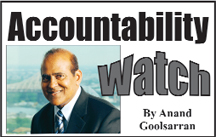A clean confession, combined with a promise never to commit the sin again, when offered before one who has the right to receive it, is the purest form of repentance.
Mahatma Gandhi
As I reflect on the above statement, I cannot help but recall the Republic Day accident involving the Minister of Finance when he failed to stop at a major road while driving a motor vehicle. As a result, he crashed head-on into another vehicle hurtling it into the nearby trench, with the driver and a passenger inside. The Minister reportedly failed not only to remain on the scene of the accident until the Police arrived, as required by law, but also to render assistance to the victims of the accident.
Our Attorney General, instead of advising the Minister of his legal and moral obligation in relation to the accident, chose to defend his ministerial colleague. His explanation appeared confusing in that on the one hand, he stated that he did so in his official capacity while in the other, he claimed that he was acting in his private capacity. To compound matters, under public pressure, the Police issued a statement that it was following a special protocol, previously unheard of, for dealing with accidents involving high ranking public officials. Later, the Police issued a further statement indicating that it had investigated the matter and that the file was sent to the Director of Public Prosecutions (DPP) for advice. The latest information is that the file was returned to the Police but it is not publicly known what that advice is.
Putting aside the overwhelming evidence that the Minister might have broken the law, he may very well be advised to seriously reflect on the above words from Gandhi and in all humility do the honourable thing by apologising to the citizens of this country for indiscretion. Unless he does so, the issue will not be forgotten and will leave an indelible stain on him for

